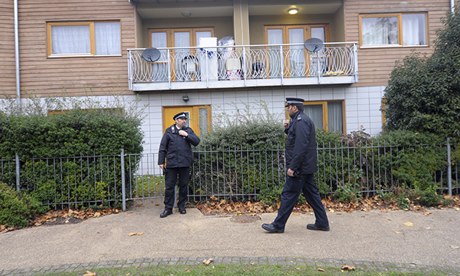Apartment in Brixton, south London is only one piece in a complex jigsaw that police are trying to piece together

Metropolitan police officers at the home in Peckworth Place, Lambeth, south London where three women were held as slaves. Photograph: Johnny Armstead/Demotix/Corbis
Police have identified 13 addresses in London linked to the couple suspected of holding three women as prisoners for at least 30 years in a cult-type arrangement dominated by physical and mental abuse.
The number of properties associated with the couple, who are both aged 67, suggests the victims were moved around several times over the past three decades.
The police continued to carry out house-to-house inquiries on Sunday at the latest address where the "family" lived – a ground-floor flat in Peckford Place, Angell Town, Brixton, south London, owned by Lambeth council.
That flat is only one piece in a complex jigsaw that the police are trying to piece together over a 30-year period. Many of these locations may have been home to the women – two of whom joined the male suspect 30 years ago because they followed the same ideology.
The police have likened the social setup in which they lived to a collective, and other sources have described the extreme emotional control which held the women within the household as "cult-like".
The two suspects arrested over the discovery are believed to have also been arrested several times in the 1970s, linked to their roles in a far-left political movement based in Brixton.
The Metropolitan police said on Sunday that it had not received any contact from neighbours or members of the public raising concerns about the suspects, and the women living with them. But the police have admitted they had originally arrested the suspects, who are of Indian and Tanzanian descent, in the 1970s.
The three women allegedly kept as slaves are a 69-year-old Malaysian, a 57-year-old Irish woman and a 30-year-old Briton. Police confirmed the youngest woman – whom sources suggest is the Irish woman's daughter – has a birth certificate.
There is also a suggestion that the police and social services were contacted by a member of the public 15 years ago to alert them to the fact the youngest woman was not attending school.
Lambeth social services have had contact with the family, it is understood. But there is a suggestion that the authorities might have been prevented from taking any action because the victims vetoed it.
An impassioned letter to a neighbour, written by the youngest woman in the apartment where the family lived, revealed her desperate situation. The woman, who is aged 30 and is understood to have been born within the collective, told her neighbour in one letter that she felt "like a fly trapped in a spider's web".
The woman was said to have become infatuated with the neighbour, Marius Feneck, 26. Feneck's partner claimed the woman sent him more than 500 letters over seven years, some scented and with kisses on them. According to reports, she wrote in one letter: "They imprisoned me here, locking all the doors and windows." The letter also claims that she suffers "unspeakable torment" and repeatedly criticises her alleged captors "who dare to call themselves my 'relatives'".
More than 30 police officers are now dedicated to what Commander Steve Rodhouse has said is a "painstaking" investigation which centres on how they met and what happened between them. "We believe that two of the victims met the male suspect in London through a shared political ideology, and that they lived together at an address that you could effectively call a 'collective'," he said.
"Somehow that collective came to an end and the women ended up continuing to live with the suspects. How this resulted in the women living in this way for over 30 years is what are seeking to establish, but we believe emotional and physical abuse has been a feature of all the victims' lives. The people involved, the nature of that collective and how it operated is all subject to our investigation and we are slowly and painstakingly piecing together more information. I will not give any further information about it."
The suspects are on police bail. They are suspected of keeping the women in a state of domestic servitude, of false imprisonment and carrying out physical violence towards them. Police said that emotional and physical abuse appeared to have been a feature of all the victims' lives.
The three women were helped to escape from the apartment by charity workers and police on 25 October.They had allegedly been held against their will since the eldest two first joined what police called "a collective", organised around a shared political ideology, more than 30 years ago.
No comments:
Post a Comment